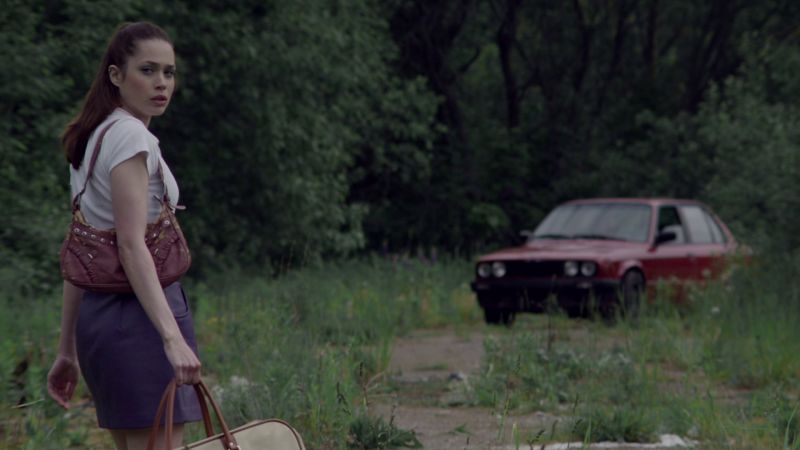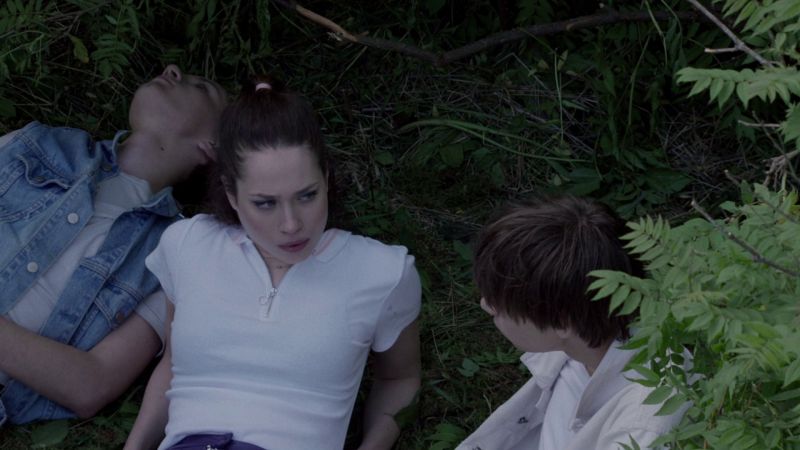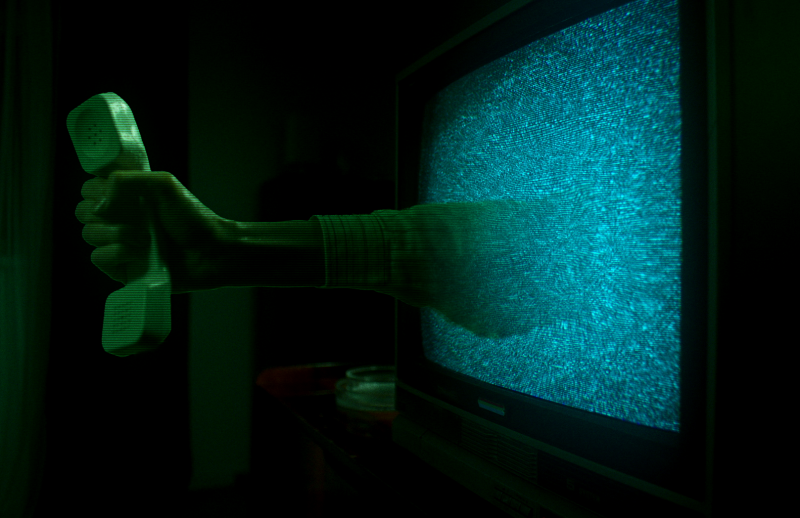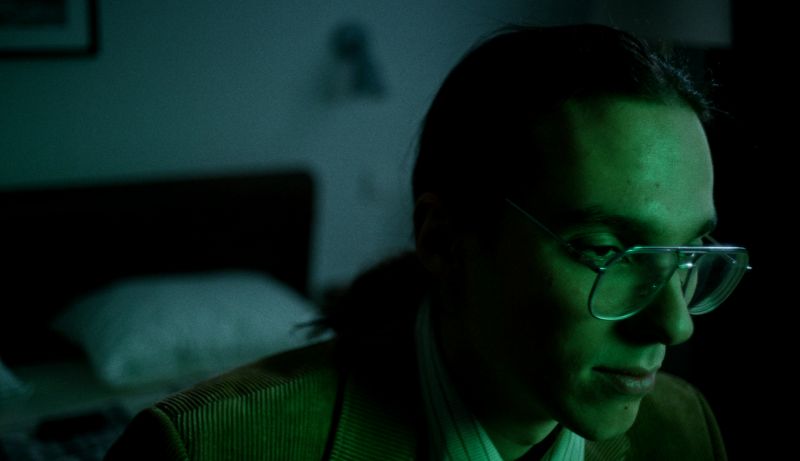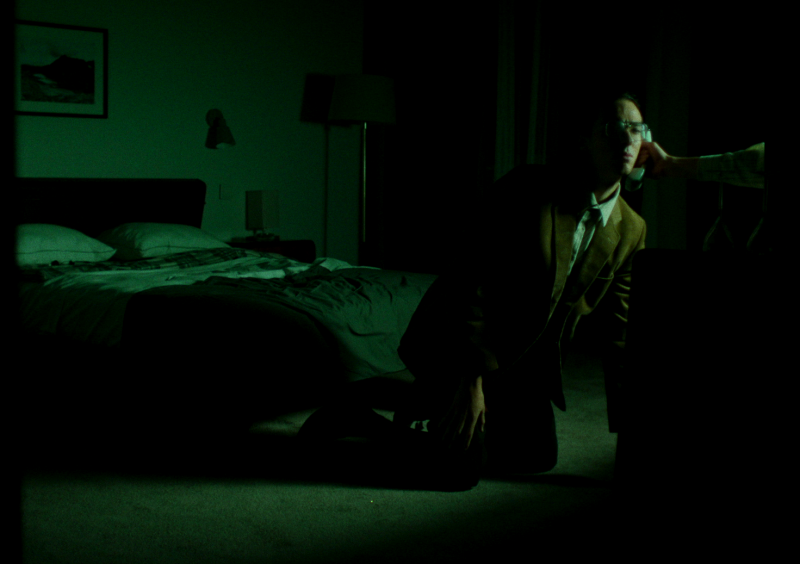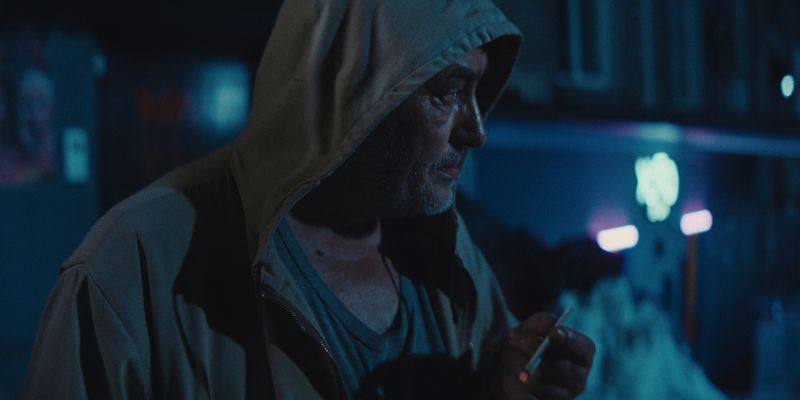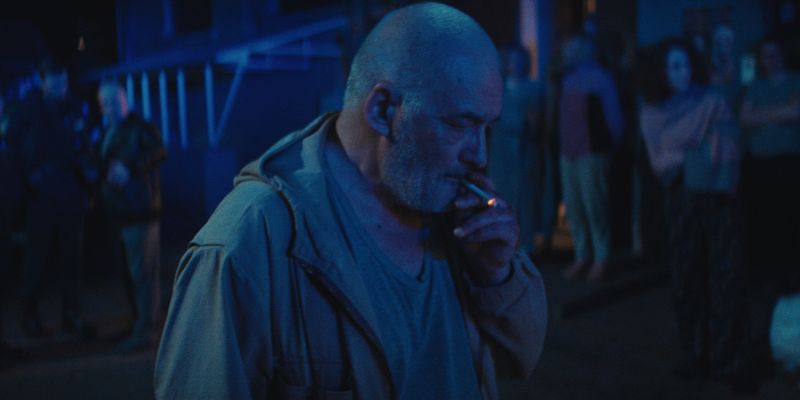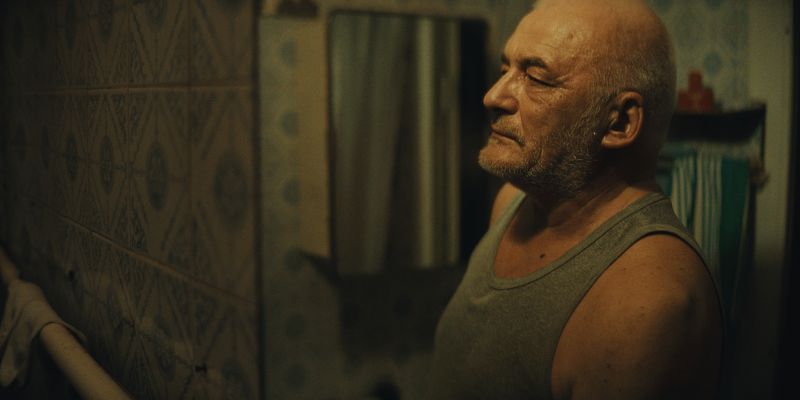Industry

 Accreditation
Accreditation
Accreditation for filmmakers, industry professionals and press representatives for the 41st Kurzfilm Festival Hamburg starts in May 2025.
Film professionals and students, representatives from press, cinema, film institutions, curation, distribution, sales, film festivals, film funding, production, television and streaming are eligible for accreditation.
CONTACTS
For general questions about accreditation, please contact us by mail: accreditation@shortfilm.com

 Industry-Events 2025
Industry-Events 2025
Accompanying the 41st Kurzfilm Festival Hamburg, we offer a series of industry events on current topics and issues for visitors from the film industry, students and interested members of the public. We invite you to ask film industry representatives your questions, exchange ideas and network within the framework of talks, workshops and case studies.
At the end of the Industry Day we invite you to drinks in the Playground at 4 pm. The Industry Day is presented with kind support of Creative Europe Desk Hamburg.

Pitch, Please! – From Story to Screen share
Wed, 04.06. 10:00
Festival Center Post Tanzstudio Jenny Beyer

Pitching ist eine Kunst — und eine essentielle Fähigkeit für alle, die ihre Filme realisieren möchten. Der Workshop »Pitch, Please! — From Story to Screen« bringt Teilnehmer:innen des Filmhochschultages das Handwerkszeug zwischen Theorie und Praxis bei und klärt dabei zentrale Fragen wie: Worum geht in meinem Film—in einem Satz? Wie wecke ich Interesse? Wie erzähle ich in wenigen Minuten von meinem Projekt? Was macht mein Projekt einzigartig? Und wie überzeuge ich potenzielle Partner:innen von meiner Vision?
Die Ergebnisse des Workshops werden am nächsten Tag im Rahmen des Filmhochschultags präsentiert. Der Workshop wird von Norma Giannetta geleitet. Sie ist Scriptcoach und begleitet Filmprojekte wie Didi Contractor (2019) und Box (2024). Außerdem leitet sie Pitch-Coachings bei den Internationalen Kurzfilmtagen Winterthur und ist Präsidentin der Cinématte Bern.
Pitching is an art — and an essential skill for anyone who wants to realize their films. The workshop »Pitch, Please! — From Story to Screen« teaches Film School Day participants the tools of the trade between theory and practice and clarifies key questions such as: What is my movie about — in one sentence? How do I arouse interest? How do I talk about my project in just a few minutes? What makes my project unique? And how do I convince potential partners of my vision?
The results of the workshop will be presented the next day as part of the Film School Day. The workshop will be held by Norma Giannetta. She is a script coach and accompanied film projects such as Didi Contractor (2019) and Box (2024). Norma also leads pitch coaching sessions at the International Short Film Festival Winterthur and is president of Cinématte Bern.

Freshly Developed share
Wed, 04.06. 12:00
Festival Center Post Playground

Fri, 06.06. 12:00
Festival Center Post Playground

Sat, 07.06. 12:00
Festival Center Post Playground

Im dreitägigen Super-8-Workshop der Analogfilmwerke lernen die Teilnehmenden anden Umgang mit der Kamera, drehen eine Filmrolle und entwickeln sie vor Ort auf dem Festivalgelände. Die frisch entstandenen Werke feiern während des Festivals ihre Premiere auf der Leinwand. Kommt vorbei und erlebt echtes analoges Kino! Der Workshop wird von Kodak unterstützt.
Workshop schedule:
Mi, 04.06. 12:00 - 16:00 Einführung, Kameras werden ausgehändigt
Fr, 06.06. 12:00 - 18:00 Filmentwicklung Part 1/ flexibel
Sa, 07.06. 11:00 - 18:00 Filmentwicklung Part 2/ flexibel
Sa, 07.06. 19:30 Screening der Filme
Anmeldung für den Workshop bis zum 28.05.2025 via E-Mail an antwort@shortfilm.com.
Teilnahmegebühr: 20€ mit Akkreditierung/40€ ohne Akkreditierung
Analogfilmwerke e. V. ist ein Verein in Hamburg-Altona, der analoges Filmemachen und Fotografieren liebt und für alle zugänglich macht. Analogfilmwerke stellt Wissen und Ressourcen bereit, um allen Interessierten die Möglichkeit zu geben, mit verschiedenen traditionellen und experimentellen Techniken auf und mit analogem Filmmaterial zu arbeiten. Analogfilmwerke ist Teil des weltweiten Netzwerkes Filmlabs.org.
In this three-day Super 8 workshop by Analogfilmwerke, participants learn how to use the camera, shoot a roll of film, and develop it on-site at the festival grounds. The freshly created works will celebrate their premiere on the big screen during the festival. Come by and experience true analog cinema! The workshop is supported by Kodak.
Workshop schedule:
Wed, 04.06. 12:00 - 16:00 Introduction, Cameras are handed out
Fri, 06.06. 12:00 - 18:00 Film processing Part 1/ flexible
Sat, 07.06. 11:00 - 18:00 Film processing Part 2/ flexible
Sat, 07.06. 19:30 Screening of the Films
Register for the workshop by May 28, 2025 via email to antwort@shortfilm.com.
Participation Fee: € 20 with accreditation / € 40 without accreditation
Analogfilmwerke e. V. is an organization based in Hamburg-Altona that loves analog filmmaking and photography and makes them accessible to everyone. Analogfilmwerke provides knowledge and resources to give everyone who is interested the opportunity to work with and on analog film material using various traditional and experimental techniques. Analogfilmwerke is part of the worldwide network Filmlabs.org.

İlker Çatak über Professionalisierung share
Thu, 05.06. 10:00
Festival Center Post Saal

Der Übergang vom Studium ins freie künstlerische Arbeiten verläuft selten geradlinig. Zwischen Ausbildung und Beruf liegen oft Unsicherheiten, Fragen und Chancen. Regisseur İlker Çatak spricht mit Moderatorin Jing Haase über seinen Weg in die Filmbranche — von seinem Studium an der Hamburg Media School über frühe Festivalerfolge, etwa beim Kurzfilm Festival Hamburg, bis hin zu internationaler Anerkennung. Sein Spielfilm Das Lehrerzimmer war 2024 für den Oscar als Bester Internationaler Film nominiert.
Im Gespräch gibt er persönliche Einblicke in Entscheidungen, Hürden und Wendepunkte, die ihn geprägt haben. Was brauchen junge Filmschaffende wirklich, um ihren Einstieg zu finden? Welche Strukturen helfen und wo liegt die Verantwortung der Branche? Ein Gespräch über Professionalität, Beharrlichkeit und den langen Atem im Filmemachen—für alle, die den Sprung von der Ausbildung in die freie Praxis wagen wollen.
Eingeladen durch die MOIN Filmförderung Hamburg Schleswig-Holstein
Transitioning from studying to working as a freelance artist rarely works out in a straightforward manner. There are often uncertainties, questions, as well as opportunities, between training and career. Director İlker Çatak talks to presenter Jing Haase about his path into the film industry—from his studies at the Hamburg Media School to early festival successes, such as at the Kurzfilm Festival Hamburg, to international recognition. His feature film The Teachers’ Lounge was nominated for an Oscar for Best International Film in 2024.
In this interview, he provides personal insights into the decisions, hurdles and turning points that have shaped him. What do young filmmakers really need to get started? What structures help and where does the industry’s responsibility lie? A conversation about professionalism, perseverance and staying power in filmmaking—for anyone who wants to take the leap from training to freelance work.
Invited by MOIN Filmförderung Hamburg Schleswig-Holstein

Film Academies in Focus share
Thu, 05.06. 10:35
Festival Center Post Saal

Im Rahmen des Filmhochschultages präsentieren sich die fünf Partnerhochschulen des Kurzfilm Festival Hamburg mit einem kompakten Überblick über ihre Profile, Studienschwerpunkte und Nachwuchsförderung. Im Gespräch mit Jing Haase widmen sie sich zentralen Fragestellungen der jeweiligen Hochschulen im Vergleich. Vertreter:innen der Hochschulen geben Einblicke in die jeweiligen Ausbildungskonzepte, begleitet von ausgewählten Kurzfilmen und Projektausschnitten.
As part of the Film School Day, the five partner universities of the Kurzfilm Festival Hamburg will present a compact overview of their profiles, main areas of study and talent promotion. In conversation with Jing Haase, they will address central questions of the respective universities in comparison. Representatives of the universities will provide insights into their respective educational concepts, accompanied by selected short films and project excerpts.

KIMO National Film School: Baltic Cinema share
Thu, 05.06. 11:50
Festival Center Post Saal

Die diesjährige School of Honor stellt sich vor: Die Studienkoordinatorin Dovilė Lapinskaitė sowie der Student Paulius Jusevičius geben in einem Gespräch Einblicke in das Ausbildungsmodell, den Studienalltag und die Besonderheiten der litauischen Filmschule. Anschließend präsentiert die Hochschule eine Auswahl aktueller Arbeiten ihrer Studierenden. Die Filme spiegeln KIMOs Hands-on-Ausbildung, interdisziplinäre Zusammenarbeit und den frischen Blick einer neuen Generation europäischer Filmschaffender wider.
In Kooperation mit Creative Europe Desk Lithauen und Creative Europe Desk Hamburg
This year's School of Honor introduces itself: The study coordinator Dovilė Lapinskaitė and student Paulius Jusevičius provide insights into the training model, everyday life and special features of the Lithuanian film school in a discussion. The school will then present a selection of current works by its students. The films reflect KIMO’s hands-on training, interdisciplinary collaboration and the fresh perspective of a new generation of European filmmakers.
In co-operation with Creative Europe Desk Lithauen und Creative Europe Desk Hamburg

Presentation: Pitch, Please! – From Story to Screen share
Thu, 05.06. 13:50
Festival Center Post Saal

Im Workshop »Pitch, Please! — From Story to Screen« arbeiteten Studierende an der Entwicklung und Präsentation ihrer Filmideen, um Inhalte und persönliche Handschrift überzeugend zu vermitteln. Jetzt präsentieren sie ihre Ergebnisse: kreative Pitches, die von dokumentarischen über fiktionale bis hin zu hybriden Projekten die Vielfalt und Leidenschaft der nächsten Generation Filmschaffender zeigen.
In the »Pitch, Please! — From Story to Screen« workshop, students worked on developing and presenting their film ideas in order to convincingly convey their content and personal style. Now they are presenting their results: creative pitches that show the diversity and passion of the next generation of filmmakers, from documentary to fictional and hybrid projects.

Table Talk: Your Direct Line to The Industry share
Thu, 05.06. 15:00
Festival Center Post Saal

Wie geht es weiter nach dem Film? Welche Wege gibt es für Vertrieb, Festivals und Förderung? »Table Talk« bringt Studierende und Branchenvertreter:innen an einen Tisch—im wahrsten Sinne des Wortes. In Kleingruppen haben die Teilnehmenden die Möglichkeit, in vier 15-minütigen Slots in direkten Austausch mit Expert:innen aus Vertrieb, Festivalstrategie, Produktion und Nachwuchsförderung zu gehen.
Mit dabei sind unter anderem Julia Grosch (Studio Hamburg Production Group), Armin Schneider (YTF Young Talent Foundation), Andreas Rautenberg (Hamburg Kreativ Gesellschaft), Katie und Ian Bignell (Festival Formular), Lisa Emer (Creative Europe Desk Hamburg), Amos Geva (T-Port), Tam Dan Vu (Travelling Distribution), Stella Flicker (MOIN Filmförderung Hamburg Schleswig-Holstein), Kurzfilm Verleih Hamburg, Kurzfilm Vertrieb Hamburg sowie weitere Vertreter:innen aus der Branche.
What happens after making the film? What paths are there for distribution, festivals and funding? »Table Talk« brings students and industry representatives together—in the truest sense of the word. In small groups, participants have the opportunity to engage in a direct exchange with experts from distribution, festival strategy, production and the promotion of young talent in four 15-minute slots.
Participants include Julia Grosch (Studio Hamburg Production Group), Armin Schneider (YTF Young Talent Foundation), Andreas Rautenberg (Hamburg Kreativ Gesellschaft), Katie and Ian Bignell (Festival Formular), Lisa Emer (Creative Europe Desk Hamburg), Amos Geva (T-Port), Tam Dan Vu (Travelling Distribution), Stella Flicker (MOIN Filmförderung Hamburg Schleswig-Holstein), Kurzfilm Distribution Hamburg, Kurzfilm Sales Hamburg and other industry representatives.

Apéro Closing share
Thu, 05.06. 16:30
Festival Center Post Club
Nach einem Tag voller Input, Gespräche und neuer Kontakte laden wir euch ein, den Filmhochschultag entspannt ausklingen zu lassen. Bei einem Drink gibt es die Gelegenheit, die Gespräche des Tages fortzuführen und neue Kontakte zu vertiefen.
After a day full of input, discussions and new contacts, we invite you to bring the Film Academy Day to a relaxed close. Participants will have the opportunity to continue the day's discussions and make new contacts over a drink.

Open Screen Session share
Thu, 05.06. 20:00
Festivalzentrum Post
Zum inoffiziellen Abschluss bietet die Open Screen Session die Gelegenheit,gemeinsam Filme zu entdecken und den Tag entspannt ausklingen zu lassen. Studierende haben die Möglichkeit, ihre eigenen Arbeiten — ob Kurzfilm, Experiment oder Rohschnitt — spontan mitzubringen und sich und ihre Werke auf der großen Leinwand zu präsentieren.
As an unofficial finale, the Open Screen Session offers a chance to discover films together and bring the day to a close. Students have the opportunity to spontaneously bring their own work — whether it’s short films, experiments or rough cuts — and present themselves and their work on the big screen.

Wake-up Call share
Fri, 06.06. 09:30
Festival Center Post Club
Der Industry Day am Festival-Freitag beginnt entspannt mit einem Wake-up-Call. Bei Kaffee und Franzbrötchen starten wir gemeinsam in einen Tag voller praxisnahem Input, spannender Einblicke und offener Gespräche.
The Industry Day on the Friday of the festival begins in a relaxed manner with a wake-up call. Over coffee and local cinnamon-flavored pastries, we start a day full of practical input, exciting insights and open discussions.

Keynote: Hamze Bytyçi On Love share
Fri, 06.06. 10:00
Festival Center Post Saal

Das Team des International Festival of Romani Film AKE DIKHEA? (übersetzt: »Na, siehst du?«) organisiert ein europaweit einzigartiges Filmfestival. Seit 2017 kuratieren Roma* selbst Filme und zeigen sie auf dem Festival in Berlin. Der künstlerische Leiter Hamze Bytyçi und sein Team entscheiden gemeinsam, welche Geschichten gezeigt und welche Perspektiven sichtbar werden, um gängige Stereotype zu durchbrechen. AKE DIKHEA? ist nicht nur ein Treffpunkt, sondern ein politischer Raum, in dem Kunst, Widerstand und Selbstbestimmung zusammenkommen. Mit dem AVAZYA-Network, dem ersten transnationalen Netzwerk für Roma*-Filmschaffende, entstand zudem eine Plattform für Austausch, Förderung und Solidarität in ganz Europa.
Diese bietet Strukturen, in denen Roma*-Filmschaffende ihre Stimmen erheben, sich vernetzen und aktiv die europäische Filmindustrie mitgestalten. AKE DIKHEA? und AVAZYA sind Leuchttürme für Vielfalt, Sichtbarkeit und nachhaltigen Wandel—und zeigen: Liebe kennt keine Ausgrenzung.
The team behind the International Festival of Romani Film AKE DIKHEA? (translated: »Well, Can You See?«) committed to a film festival that is truly unique in Europe. Since 2017, Roma themselves curated films and presented them at the festival in Berlin. Together with his team, artistic director Hamze Bytyçi decides which stories are told and which perspectives are made visible, breaking through common stereotypes. AKE DIKHEA? is not just a meeting place but a political space where art, resistance, and self-determination unite. The associated AVAZYA Network, the first transnational network for Romani filmmakers, represents a platform for exchange, support, and solidarity across Europe. The network provides structures where Roma filmmakers can raise their voices, connect, and actively help shape the European film industry. AKE DIKHEA? and AVAZYA are beacons for diversity, visibility, and lasting change—showing that love knows no exclusion.

The Arts and Crafts of »Filmvermittlung« share
Fri, 06.06. 10:30
Festival Center Post Saal

Das Filmgespräch im Kino, der praktische Workshop mit Kindern, die Jugendjury auf dem Festival: »Filmvermittlung« hat unzählige Formen und passiert überall dort, wo es um Filme—besonders gern auch kurze Filme — geht. Versucht man den Begriff zu übersetzen, wird klar, wie vielseitig das Feld ist: Mediation, Communication/Exchange, Agency, Literacy, Education, ...
Trotzdem ist die filmvermittelnde Arbeit in Deutschland kaum institutionalisiert und die Expert:innen, die die Vermittlung leisten, stehen oft allein vor der Leinwand oder der Schulklasse.
Um das zu ändern, traf sich eine Gruppe freier Filmvermittler:innen vor zwei Jahren beim Kurzfilm Festival Hamburg, um gemeinsam die ersten Schritte zur Gründung einer Interessenvertretung zu gehen. Das Thema, damals wie heute: die »Arts and Crafts« der Filmvermittlung. Wo begegnet sie uns, wo soll sie hinführen? Wann ist sie gelungen und wer bezahlt diejenigen, die sie möglich machen? Wie wird sie sichtbar und wirksam? Mit Gesprächspartner:innen und Publikum sammeln wir Antworten, Impulse und Erkenntnisse.
Mit:
Lina Paulsen (Junges Kurzfilm Festival Hamburg Mo&Friese, u. a.)
Gudrun Sommer (DOXS Ruhr, u. a.)
Luc-Carolin Ziemann (freischaffende Filmvermittlerin)
Fabian Fornalski (freischaffender Filmvermittler)
Host: Lili Hartwig (Kurzfilm Agentur e.V., u. a.)
The film conversation at the cinema, the practical workshop with children, the youth jury at the festival: »Filmvermittlung« takes countless forms and happens wherever films — especially short films — are involved. If you try to translate the term into English, it becomes agency, literacy, education, etc.
And yet, film mediation work in Germany is hardly institutionalized and the mediation experts often find themselves standing alone in front of the screen or the school class.
In order to change this, a group of freelance film mediators met two years ago at the Kurzfilm Festival Hamburg to take the first steps towards founding an interest group. The topic, then as now: the »arts and crafts« of film mediation. Where do we encounter it, where should it lead? When is it successful and who pays those who make it possible? How does it become visible and effective? Together with discussion partners and the audience, we will gather answers, impulses and insights.
With:
Lina Paulsen (Junges Kurzfilm Festival Hamburg Mo&Friese, a. o.)
Gudrun Sommer (DOXS Ruhr, a. o.)
Luc-Carolin Ziemann (freelance film mediator)
Fabian Fornalski (freelance film mediator)
Host: Lili Hartwig (Kurzfilm Agentur e.V., a. o.)

Roundtable Discussions share
Fri, 06.06. 11:30
Festival Center Post Saal

Im Rahmen des Industry Days öffnen wir den Raum für offene Gespräche auf Augenhöhe: Bei unseren Roundtable Discussions treffen in zwei Runden à 45 Minuten Branchenvertreter:innen in kleiner Runde aufeinander, um sich über konkrete Herausforderungen und Fragestellungen der Film- und Festivalwelt auszutauschen. An zehn Tischen wird diskutiert, reflektiert und vernetzt.
TISCH 1: GRÜNES LICHT FÜR GRÜNE STORYS
Du möchtest spannende Geschichten über umweltbewusstes, sozial-ökologisches Verhalten erzählen, die Zuschauer:innen bewegen und inspirieren, ohne didaktisch zu sein? Dieser Runde Tisch stellt verschiedene Dimensionen des Green Storytelling vor, die in verschiedenen Phasen des Stoffentwicklungsprozesses integriert werden können. Wir diskutieren praktische Tipps, um Nachhaltigkeit schon beim Drehbuchschreiben zu berücksichtigen, tauschen Best Practices aus und sprechen über Herausforderungen.
Host: Maike Sarah Reinerth (Filmuniversität Babelsberg KONRAD WOLF, Green Storytelling Initiative)
TISCH 2: BILDET BANDEN! STÄRKUNG DURCH WISSENSAUS-
TAUSCH STATT ISOLIERUNG DURCH EINZELKAMPF (FLINTA-ONLY)
Was braucht es für Frauen und Queers in einem Filmbetrieb, der immer noch sehr auf cis männliche Genie-Narrative abfährt? An diesem Tisch tauschen wir uns über unser Filmschaffen, Politiken und Strategien, aber auch über Barrieren und Diskriminierung in der Filmindustrie oder an Filmhochschulen aus. Wir reden über die Selbstorganisation in Gruppen, Kollektiven und Netzwerken, die ein wichtiges Gegengewicht für Wissenstransfer unabhängig von Institutionen und Konkurrenzdenken sein können. Bildet Banden, um euch über Honorare, Produktionsfirmen, Festivals, Förderungen, Leistungsdruck, Vorbilder und nicht zuletzt eure eigene Arbeit auszutauschen!
Host: Franzis Kabisch (Filmemacherin, Filmgruppe »Lust & Krise«)
TABELLE 3: KANON ODER CHAOS? WERTE IN DER KURZFILM-KULTUR NEU ÜBERDENKEN
Es ist viel über den »Kanon« im Film und damit auch in der Kunstkritik gesprochen worden. Mehr als alles andere ist eine kanonisierte Liste ein reines Spiegelbild ihrer Zeit und eine begrenzte Angelegenheit, die durch die Augen derer gefärbt ist, die sie aufstellen. Aber gibt es so etwas wie einen »Kurzfilmkanon«? Und wenn ja, welche Rolle spielen Festivalprogrammer, Kunstkritiker:innen und das Publikum, wenn es darum geht, ihn zu pflegen, zu brechen und/oder zu erweitern? Oder sollen wir gleich aufhören und sagen, wie es ist: Jeder Kanon ist fehlerhaft, also wen kümmert’s? Basierend auf einer Sammlung, die wir beim Kurzfilm Festival Hamburg 2019 gemacht haben, werden wir weiterdenken.
Host: Niels Putman (Talking Shorts)
TISCH 4: NARRATIVE VERANTWORTUNG: WER DARF ÜBER WEN SPRECHEN?
Diese zentrale Frage steht im Mittelpunkt des Roundtables mit Vertreter:innen des AKE DIKHEA? Festivals—Europas einziges, von Roma* selbst kuratiertes Filmfestival. Wie kann echte Selbstbestimmung im Kino gelingen? Welche Verantwortung trägt die Filmbranche im Umgang mit marginalisierten Perspektiven? Und welche Strukturen braucht es, um eine inklusive, vielfältige und faire Repräsentation zu ermöglichen? Gemeinsam mit dem AVAZYA Network wird diskutiert, wie neue Narrative entstehen, wie Austausch gelingt und wie nachhaltiger Wandel in der Filmindustrie vorangetrieben werden kann.
Host: Hamze Bytyçi (Künstlerischer Leiter AKE DIKHEA? International Festival of Romani Film)
TISCH 5: BLACK BOX UND WHITE CUBE: WO FINDEN KURZFILME IHR PUBLIKUM?
Der Kurzfilm Verleih macht sich dafür stark, dass Kurzfilme auch über die Festival-Welt hinaus gesehen werden. Wir setzen uns dafür ein, dass Kurzfilm dauerhaft als Film erfahren werden kann. Kurzfilm als Vorfilm im Kino ist dabei nur eine Möglichkeit, Kurzfilme zur Aufführung zu bringen. Gleichzeitig ist die Kunstwelt schon lange auf den Kurzfilm gekommen. In der Praxis scheint die Grenze zwischen Kino und Kunstwelt jedoch oft unüberwindbar. Der Roundtable bringt Distributor:innen, Kinomachende und Galerist:innen zusammen. Gemeinsam wollen wir erörtern: In welchen Kontexten können Kurzfilme ihr Publikum finden?
Host: Mara Marxsen (Kurzfilm Agentur Hamburg)
TISCH 6: KINO ALS BEUTE
Lass uns ins Kino gehen! Kino als Moment mit Freund:innen oder allein. Kino als Raum des Austauschs, als Brücke zwischen unterschiedlichen gesellschaftlichen Räumen und Erfahrungen. Was braucht es, um Kino wirklich als sozialen Diskursraum zu verstehen, zu gestalten, zu leben? Kino muss als Raum gedacht werden—nicht nur gebaut. Wo Kommerz weicht, kann etwas Gemeinsames wachsen. Welche Rolle spielt die Identität der Stadt? Wie viel Leinwand braucht das Kino der Zukunft? Was braucht es für Austausch — wer zahlt ihn, wo findet er statt? Wie kann Kino ein Ort werden, um Solidaritäten zu leben — transnational, urban, gemeinsam?
Hosts: Can Sungu und Malve Lippman (Sinema Transtopia)
TISCH 7: ARE YOU AWARE?
Awareness-Konzepte und -Arbeit sind inszwischen aus kaum einem Festival mehr wegzudenken. Aber wie übertragbar ist Party-Awareness auf andere Kulturformate—etwa Lesungen, Performances oder Filmfestivals? Wie schaffen wir ein aufmerksames Bewusstsein für unterschiedliche Erfahrungshorizonte und Traumata, ohne Bevormundung oder verflachte Inhalte? Was ist unser genaues Ziel, wie schulen wir unser Team und wann benötigen wir andere Professionen? Gemeinsam versuchen wir, Awareness weiterzudenken — kontextsensibel, solidarisch, konkret.
Host: Nina Reiprich (fluctoplasma Festival)
TISCH 8: NEUE HACKS: TECHNOLOGIEN, DIE DIE FILMINDUSTRIE UMGESTALTEN
Treten wir in eine Ära Mensch gegen Maschine ein? Müssen wir geistiges Eigentum neu definieren? Ist die Datenanalyse der neue Weg zum Erfolg im Filmgeschäft? In dieser Gesprächsrunde werden wir alte Mythen hinterfragen und neue Strategien erforschen, um unsere Beziehung zu der sich rasant entwickelnden Technologie wieder in den Griff zu bekommen. Wir laden die Teilnehmer:innen dazu ein, sich kritisch — nicht skeptisch — mit neuen Werkzeugen, Rollen und Räumen auseinanderzusetzen und die Bedeutung des Kinos als kollektives Unterfangen zu bekräftigen, sogar im Zeitalter der künstlichen Intelligenz.
Hosts: Carlo Rizzo und Giulia Yoko Galbarini (CinemaO, The Black Cube)
TISCH 9: NEXT STEPS: EUROPEAN FUNDING OPPORTUNITIES AND TALENT DEVELOPMENT
Welche Fördermöglichkeiten und Weiterbildungen gibt es in Europa? Lisa Emer beantwortet Fragen rund um das europäische Förderprogramm Creative Europe MEDIA, zu Weiterbildungen und Vernetzungsmöglichkeiten in Europa. Der Roundtable wird präsentiert mit der freundlichen Unterstützung von Creative Europe Desk Hamburg.
Host: Lisa Emer (Consulting and Communication, Creative Europe Desk Hamburg)
TISCH 10: STREAM ME IF YOU CAN
Der Kurzfilm findet online zunehmend neue Bühnen — doch wo geht es für ihn wirklich hin? In unserer Gesprächsrunde diskutieren wir, wie sich der Markt für Kurzfilme im digitalen Raum verändert: Welches Streaming passt zu welchem Kurzfilm? Welche Plattformen lohnen sich für Filmschaffende? Welche Rolle spielen neue Formate wie FAST-Channels (Free Ad-supported Streaming Television)? Gemeinsam mit Expert:innen aus Branche und Praxis werfen wir einen Blick auf Chancen, Herausforderungen und Zukunftsperspektiven für das Streamen von Kurzfilmen.
Host: Stine Wangler (Kurzfilm Agentur Hamburg)
As part of the Industry Day, we open up the space for open discussions at eye level: at our Roundtable Discussions, industry representatives meet in small groups in two rounds of 45 minutes each to discuss specific challenges and issues in the film and festival world. Discussion, reflection and networking take place at ten tables.
TABLE 1: GREEN LIGHT FOR GREEN STORIES
Want to tell exciting stories about environmentally friendly and socio-ecological behavior that move and inspire your viewers without being didactic? This roundtable discussion and workshop introduces different dimensions of green storytelling that can easily be integrated at different stages of the script development process. We will explore practical screenwriting skills to emphasize sustainability, exchange best-practices and discuss challenges.
Host: Maike Sarah Reinerth (Film University Babelsberg KONRAD WOLF, Green Storytelling Initiative)
TABLE 2: FORM BONDS! EMPOWERMENT THROUGH KNOWLEDGE EXCHANGE INSTEAD OF ISOLATION THROUGH INDIVIDUAL STRUGGLE (FLINTA-ONLY)
What does it take for women and queers in a film industry that still relies heavily on cis male genius narratives? At this table, we will talk about our filmmaking, policies and strategies, but also about barriers and discrimination in the film industry or at film schools. We will talk about self-organization in groups, collectives and networks, which can be an important counterweight for knowledge transfer independent of institutions and competitive thinking. Form bonds to exchange ideas about fees, production companies, festivals, funding, performance pressure, role models and, last but not least, your own work!
Host: Franzis Kabisch (filmmaker, film group »Lust & Krise«)
TABLE 3: CANON OR CHAOS? RETHINKING VALUE IN SHORT FILM CULTURE
Much has been said about »the canon« in film and, by extension, art criticism. More than anything, a canonised list is a sheer reflection of its time and a limited affair coloured through the eyes of those who install it. But is there such a thing as the »short film canon«? And if yes, what is the role of festival programmers, art critics, and the audience in nurturing, breaking, and/or expanding it? Or shall we stop immediately and say it like it is: every canon is flawed, so who cares? Based on a collection we did at Kurzfilm Festival Hamburg in 2019 we will continue thinking.
Host: Niels Putman (Talking Shorts)
TABLE 4: NARRATIVE RESPONSIBILITY: WHO IS ALLOWED TO TALK ABOUT WHOM?
This central question is the focus of the round table with representatives of the AKE DIKHEA? Festival—Europe’s only film festival curated by Roma themselves. How can real self-determination succeed in cinema? What responsibility does the film industry have in dealing with marginalized perspectives? And what structures are needed to enable inclusive, diverse and fair representation? Together with the AVAZYA Network, we will discuss how new narratives emerge, how exchange can succeed and how sustainable change can be driven forward in the film industry.
Host: Hamze Bytyçi (Artistic Director AKE DIKHEA? International Festival of Romani Film)
TABLE 5: BLACK BOX AND WHITE CUBE: WHERE DO SHORT FILMS FIND THEIR AUDIENCE?
The Kurzfilm Verleih Hamburg is committed to ensure that short films are seen beyond the festival world. We are working on making sure that short film can be permanently experienced as film. Short film as a supporting film in the cinema is just one way of presenting short films. At the same time, the art world has long since embraced the short format. In practice, however, the boundary between cinema and art world often seems insurmountable. The roundtable brings together distributors, cinemas and gallery owners. Together we want to discuss: In which contexts can short films find their audience?
Host: Mara Marxsen (Kurzfilm Agentur Hamburg)
TABLE 6: CINEMA AS LOOT
Let’s go to the movies! Cinema as a moment with friends or on your own. Cinema as a space for exchange, as a bridge between different social spaces and experiences. What does it take to really understand, shape and live cinema as a social space for discourse? Cinema must be thought of as a space—and not merely as a building. Where commerce gives way, something common can grow. What role does the identity of the city play? How much screen space does the cinema of the future need? What is needed for exchange—who pays for it, where does it take place? How can cinema become a place for lived solidarity—transnational, urban, together?
Hosts: Can Sungu and Malve Lippman (Sinema Transtopia)
TABLE 7: ARE YOU AWARE?
Awareness concepts and work are now an integral part of almost every festival. But how transferable is party awareness to other cultural formats—such as readings, performances or film festivals? How do we create an attentive awareness of different horizons of experience and trauma without patronizing or flattened contents? What exactly is our goal, how do we train our team and when do we need other professions? Together we try to think awareness further — context-sensitive, solidary, concrete.
Host: Nina Reiprich (fluctoplasma Festival)
TISCH 8: NEW HACKS: TECHNOLOGIES RESHAPING THE FILM INDUSTRY
Are we entering a Human vs. Machine era? Do we need to redefine IP? Is data analysis the new path to filmmaking success? In this roundtable, we will challenge stale myths and explore new strategies to reclaim agency in our relationship with rapidly advancing technology. We invite participants to engage critically — not skeptically — with emerging tools, roles and spaces, and to reaffirm the importance of cinema as a collective endeavor, even in the age of Artificial Intelligence.
Hosts: Carlo Rizzo and Giulia Yoko Galbarini (CinemaO, The Black Cube)
TABLE 9: NEXT STEPS: EUROPEAN FUNDING OPPORTUNITIES AND TALENT DEVELOPMENT
Which opportunities for funding and further training exist in Europe? Lisa Emer will answer questions about the European funding program Creative Europe MEDIA, further education and networking opportunities in Europe. The roundtable is presented with the kind support of Creative Europe Desk Hamburg.
Host: Lisa Emer (Consulting and Communication, Creative Europe Desk Hamburg)
TABLE 10: STREAM ME IF YOU CAN
More and more, short films are finding new platforms online — but where are they really headed? At our round table, we discuss how the market for short films is changing in the digital space: Which kind of streaming suits which short film? Which platforms are worthwhile for filmmakers? What role do new formats such as FAST channels (Free Ad-supported Streaming Television) play? Together with experts from the industry and the field, we will take a look at the opportunities, challenges and future prospects for streaming short films.
Host: Stine Wangler (Kurzfilm Agentur Hamburg)

Meet and Greet share
Fri, 06.06. 11:30
Festival Center Post Lampenlager

Die AG Filmvermittlung setzt sich als Interessenvertretung dafür ein, das Berufsfeld der freischaffenden Filmvermittler:innen sichtbarer zu machen, faire Arbeitsbedingungen zu fordern und Film als Teil der kulturellen Bildung zu stärken. In Kurzpräsentationen und offenen Austauschrunden stellt sich der junge Verein vor und gibt einen Einblick in seine Strukturen, Ziele und ersten Projekte. Mitglieder, Verbündete und Unterstützer:innen sowie Interessierte, die gerne Mitglied werden möchten, sind eingeladen, sich kennenzulernen und zu vernetzen, gemeinsame Projekt- und Kooperationsideen zu spinnen oder aktiv Teil von Arbeitsgruppen zu werden.
Hosts:
Eva-Maria Schneider-Reuter (freischaffende Filmvermittlerin)
Lisa Haußmann (freischaffende Filmvermittlerin)
As an interest group, the AG Filmvermittlung is committed to make the professional field of freelance film mediation more visible, to demand fair working conditions, and to strengthen film as part of cultural education. In short presentations and open discussion rounds, the young association will introduce itself and provide an insight into its structures, goals and initial projects. Members, allies and supporters as well as interested parties who would like to become members are invited to get to know each other and network, develop joint ideas for projects and cooperation or become an active part of working groups.
Hosts:
Eva-Maria Schneider-Reuter (freelance film mediator)
Lisa Haußmann (freelance film mediator)

Freshly Developed share
Wed, 04.06. 12:00
Festival Center Post Playground

Fri, 06.06. 12:00
Festival Center Post Playground

Sat, 07.06. 12:00
Festival Center Post Playground

Im dreitägigen Super-8-Workshop der Analogfilmwerke lernen die Teilnehmenden anden Umgang mit der Kamera, drehen eine Filmrolle und entwickeln sie vor Ort auf dem Festivalgelände. Die frisch entstandenen Werke feiern während des Festivals ihre Premiere auf der Leinwand. Kommt vorbei und erlebt echtes analoges Kino! Der Workshop wird von Kodak unterstützt.
Workshop schedule:
Mi, 04.06. 12:00 - 16:00 Einführung, Kameras werden ausgehändigt
Fr, 06.06. 12:00 - 18:00 Filmentwicklung Part 1/ flexibel
Sa, 07.06. 11:00 - 18:00 Filmentwicklung Part 2/ flexibel
Sa, 07.06. 19:30 Screening der Filme
Anmeldung für den Workshop bis zum 28.05.2025 via E-Mail an antwort@shortfilm.com.
Teilnahmegebühr: 20€ mit Akkreditierung/40€ ohne Akkreditierung
Analogfilmwerke e. V. ist ein Verein in Hamburg-Altona, der analoges Filmemachen und Fotografieren liebt und für alle zugänglich macht. Analogfilmwerke stellt Wissen und Ressourcen bereit, um allen Interessierten die Möglichkeit zu geben, mit verschiedenen traditionellen und experimentellen Techniken auf und mit analogem Filmmaterial zu arbeiten. Analogfilmwerke ist Teil des weltweiten Netzwerkes Filmlabs.org.
In this three-day Super 8 workshop by Analogfilmwerke, participants learn how to use the camera, shoot a roll of film, and develop it on-site at the festival grounds. The freshly created works will celebrate their premiere on the big screen during the festival. Come by and experience true analog cinema! The workshop is supported by Kodak.
Workshop schedule:
Wed, 04.06. 12:00 - 16:00 Introduction, Cameras are handed out
Fri, 06.06. 12:00 - 18:00 Film processing Part 1/ flexible
Sat, 07.06. 11:00 - 18:00 Film processing Part 2/ flexible
Sat, 07.06. 19:30 Screening of the Films
Register for the workshop by May 28, 2025 via email to antwort@shortfilm.com.
Participation Fee: € 20 with accreditation / € 40 without accreditation
Analogfilmwerke e. V. is an organization based in Hamburg-Altona that loves analog filmmaking and photography and makes them accessible to everyone. Analogfilmwerke provides knowledge and resources to give everyone who is interested the opportunity to work with and on analog film material using various traditional and experimental techniques. Analogfilmwerke is part of the worldwide network Filmlabs.org.

KODAK: Hands On share
Fri, 06.06. 14:00
Festival Center Post Saal

Was ihr schon immer über analogen Motion-Picture-Film wissen wolltet — aber nie zu fragen wagtet: Das Industry Event von KODAK öffnet die Tür zur analogen Filmwelt und feiert den Schmalfilm. Anlässlich von 60 Jahren Super 8 und über 100 Jahre 16 mm dreht sich alles um die Magie von Silberhalogenid-Film: seine Beschaffenheit, sein Look, seine Evolution — und warum er heute aktueller ist denn je.
In einer Mischung aus Kurzvortrag, Anschauungsmaterial und praktischen Elementen wird anschaulich vermittelt, wie analoger Film funktioniert und welche kreativen Möglichkeiten er bietet. Ob ihr euch für die Technik interessiert, Fragen zur Lagerung habt oder einfach mal echtes Filmmaterial in die Hand nehmen wollt — hier ist Raum für Austausch und Inspiration.
Ein Angebot für Neugierige, Einsteiger:innen, Profis und alle, die ihre Liebe zum Filmmaterial (wieder)entdecken oder vertiefen wollen.
Host: Holger Schwaerzel
Everything you always wanted to know about analog motion picture film — but were afraid to ask: KODAK’s industry event opens the door to the world of analog film and celebrates cine film. On the occasion of 60 years of Super 8 and over 100 years of 16 mm, everything revolves around the magic of silver halide film: its composition, its look, its evolution — and why it is more relevant today than ever.
In a mixture of short lectures, illustrative material and practical elements, you will learn how analog film works and what creative possibilities it offers. Whether you are interested in the technology, have questions about storage or simply want to get your hands on some real film material — this is the space for exchange and inspiration. An offer for the curious, beginners, professionals and anyone who wants to (re)discover or deepen their love of film material.
Host: Holger Schwaerzel

Masterclass — Poggi/Vinel share
Fri, 06.06. 14:00
Festival Center Post Lampenlager

Caroline Poggi und Jonathan Vinel arbeiten seit 2012 als Regieduo. In ihren Filmen setzen sie sich mit den zentralen Fragen unserer Zeit auseinander: Verlust, Liebe, Zugehörigkeit, digitale Identität. Ihre Arbeiten — ob Kurzfilm, Langfilm oder Musikvideo — sind stilbildend für eine Generation von Filmschaffenden, die mit dem Internet aufgewachsen ist. Ihre Haltung schreibt sich über ihren ästhetischen Ansatz wie Wunden in ihre Bilder ein. Ihr Blut hat viele Farben Zwei Filme haben den künstlerischen Weg von Poggi und Vinel entscheidend geprägt und gefestigt. Ihr preisgekrönter Film Tant qu’il nous reste des fusils à pompe (Goldener Bär Berlinale 2014) ist ihre erste gemeinsame Arbeit. Der Film verhandelt den Suizid eines Freundes, der gegangen ist, ohne vorher »au revoir« zu sagen. Ein Abschied ohne Pathos, der den Tod nicht akzeptiert, sondern überwindet — eine Haltung, die sie mit dem Kino von Gus Van Sant und Andrei Tarkowski verbindet.
Der zweite Film ist Notre Héritage aus dem Jahr 2015. Als sie selbst Teenager sind und nach der Liebe fragen, werden sie allein gelassen mit dem Internet. Alleingelassen mit einem ungebändigten Universum der Bilder, Aggressionen und Filme. Ihre Antwort auf die Suche nach dem Gefühl ist dieser Film. Computerspiel, 3D-Animation, Realfilm und pornographisches Archivmaterial entspannt die Fiktion. Gerahmt von präzise kadrierten Bildern, in denen sich die Protagonist:innen zu orientieren versuchen, und dem Footage-Material von Pierre Woodman, das frei zugänglich in der Welt des Digitalen zirkuliert, bleibt die Frage nach dem Wert und der Kraft der Liebe.
Diese Post-Internet-Ästhetik, eine Ästhetik, die die Auswirkungen des Internets auf die Gesellschaft kritisch analysiert, ist fortan die Grundlage für ihre Arbeiten und ermöglicht ihnen ohne Pause zu produzieren.
Poggi und Vinel stehen nicht außerhalb der Welt, die sie zeigen — sie sind Teil davon. Ihre Arbeiten sind keine Beobachtung, sondern ein emotionaler Zustand. Sie erzählen aus der Perspektive einer Jugend, die sich in einer Welt wiederfindet, die gleichzeitig hyperreal und leer erscheint — und die sich dennoch nach Bedeutung sehnt. Für das diesjährige Kurzfilm Festival Hamburg kreierten sie den Trailer Provoke Love. In der Masterclass geben sie im Gespräch mit Maike Mia Höhne Einblick in ihre künstlerische Entwicklung, ihren Zugang zur Arbeit mit Protagonist:innen, ihr Verhältnis zu Körpern, digitalen Bildwelten und Popkultur.
Caroline Poggi and Jonathan Vinel have been working as a directing duo since 2012. In their films, they deal with the central questions of our time: loss, love, belonging and digital identity. Their works — whether short films, feature-length films or music videos — are style-defining for a generation of filmmakers who have grown up with the internet and who inscribe their aesthetics into their images like wounds.
Two films have decisively shaped and consolidated the artistic path of Poggi and Vinel. Their award-winning film Tant qu’il nous reste des fusils à pompe (Golden Bear Berlinale 2014) was their first joint work. The film deals with the suicide of a friend who left without saying »au revoir«. A farewell without pathos that does not accept death but overcomes it — an attitude that links her to the cinema of Gus Van Sant and Andrei Tarkovsky.
The second film is Notre Héritage from 2015. When they are teenagers themselves and ask about love, they are left alone with the internet. Left alone with an untamed universe of images, aggression and films. Their answer to the search for feeling is this movie. Computer games, 3D animation, real film and pornographic archive material relax the fiction. Framed by precisely framed images, in which the protagonists try to orient themselves, and the footage material by Pierre Woodman, which circulates freely accessible in the world of the digital, the question of the value and power of love remains. This post-internet aesthetic, an aesthetic that critically analyzes the effects of the internet on society, is henceforth the basis for their work and enables them to produce without pause.
Poggi and Vinel are not outside the world they show — they are part of it. Their works are not an observation, but an emotional state. They tell the story from the perspective of a youth that finds itself in a world that seems both hyper-real and empty — and yet longs for meaning. For this year’s Kurzfilm Festival Hamburg, they created the trailer Provoke Love. In this masterclass, they will give an insight into their artistic development, their approach towards working with young protagonists, their relationship to bodies, digital imagery and pop culture in conversation with Maike Mia Höhne.

Come, Let’s Go to the Cinema! share
Fri, 06.06. 14:30
Zeise 3
Auch für die allerjüngsten Zuschauer:innen bedeutet eine Filmvorführung mit anschließendem Filmgespräch, dass sie mit vielen anderen Menschen in einem dunklen Raum ohne Fenster sitzen, sich gemeinsam einen Film angucken, dabei neue Dinge und fremde Welten unterschiedlich wahrnehmen, danach sitzenbleiben und sich darüber austauschen können.
Der Workshop vermittelt die Rolle und Funktion der Moderation für sehr junge Kinder, bespricht Möglichkeiten bei Ablauf und Organisation und gibt Tipps zum Sprechen vor großen Gruppen, die die Situation im Kino noch nicht gewohnt sind. Welche Methoden bieten sich an? Wie kann Aufmerksamkeit geschaffen und Neugier geweckt werden? Es werden Spiele, Übungen und mögliche Interaktionen im Kinoraum vorgestellt und praktisch geübt.
Die Teilnahme am Workshop ist nur mit vorheriger Anmeldung via E-Mail an antwort@shortfilm.com möglich.
Der Workshop findet im Rahmen des Netzwerkprojektes KINO ENTDECKEN statt und wird von der Vision Kino unterstützt.
Sprache: Deutsch
Host: Eva-Maria Schneider-Reuter (freischaffende Moderatorin, Filmvermittlerin, Schauspielerin)
Even for the very youngest viewers, a movie screening followed by a film discussion means that they will sit in a dark room without windows with lots of other people, watch a movie together, perceive new things and foreign worlds in different ways, stay seated afterwards and talk about them.
The workshop teaches the role and function of the moderator for very young children, discusses possibilities for the process and organization and gives tips for speaking in front of large groups who are not yet used to the situation in the cinema. What methods can be used? How can attention be created and curiosity aroused? Games, exercises and possible interactions in the cinema space will be presented and practiced.
Participation in the workshop is only possible with prior registration via e-mail at antwort@shortfilm.com.
The workshop is held within the framework of the network project KINO ENTDECKEN and is supported by Vision Kino.
Language: German
Host: Eva-Maria Schneider-Reuter (freelance moderator, film
mediator, actress)

Industry Drinks share
Fri, 06.06. 15:30
Festival Center Post Playground

Gemeinsam mit KODAK laden wir zu einem entspannten Ausklang ein — bei Getränken, Filmgesprächen und dem »Entwickeln« von Netzwerken und analogen Ideen.
Together with KODAK, we invite you to a relaxed finale—with drinks, film discussions and the »development« of networks and analog ideas.

Freshly Developed share
Wed, 04.06. 12:00
Festival Center Post Playground

Fri, 06.06. 12:00
Festival Center Post Playground

Sat, 07.06. 12:00
Festival Center Post Playground

Im dreitägigen Super-8-Workshop der Analogfilmwerke lernen die Teilnehmenden anden Umgang mit der Kamera, drehen eine Filmrolle und entwickeln sie vor Ort auf dem Festivalgelände. Die frisch entstandenen Werke feiern während des Festivals ihre Premiere auf der Leinwand. Kommt vorbei und erlebt echtes analoges Kino! Der Workshop wird von Kodak unterstützt.
Workshop schedule:
Mi, 04.06. 12:00 - 16:00 Einführung, Kameras werden ausgehändigt
Fr, 06.06. 12:00 - 18:00 Filmentwicklung Part 1/ flexibel
Sa, 07.06. 11:00 - 18:00 Filmentwicklung Part 2/ flexibel
Sa, 07.06. 19:30 Screening der Filme
Anmeldung für den Workshop bis zum 28.05.2025 via E-Mail an antwort@shortfilm.com.
Teilnahmegebühr: 20€ mit Akkreditierung/40€ ohne Akkreditierung
Analogfilmwerke e. V. ist ein Verein in Hamburg-Altona, der analoges Filmemachen und Fotografieren liebt und für alle zugänglich macht. Analogfilmwerke stellt Wissen und Ressourcen bereit, um allen Interessierten die Möglichkeit zu geben, mit verschiedenen traditionellen und experimentellen Techniken auf und mit analogem Filmmaterial zu arbeiten. Analogfilmwerke ist Teil des weltweiten Netzwerkes Filmlabs.org.
In this three-day Super 8 workshop by Analogfilmwerke, participants learn how to use the camera, shoot a roll of film, and develop it on-site at the festival grounds. The freshly created works will celebrate their premiere on the big screen during the festival. Come by and experience true analog cinema! The workshop is supported by Kodak.
Workshop schedule:
Wed, 04.06. 12:00 - 16:00 Introduction, Cameras are handed out
Fri, 06.06. 12:00 - 18:00 Film processing Part 1/ flexible
Sat, 07.06. 11:00 - 18:00 Film processing Part 2/ flexible
Sat, 07.06. 19:30 Screening of the Films
Register for the workshop by May 28, 2025 via email to antwort@shortfilm.com.
Participation Fee: € 20 with accreditation / € 40 without accreditation
Analogfilmwerke e. V. is an organization based in Hamburg-Altona that loves analog filmmaking and photography and makes them accessible to everyone. Analogfilmwerke provides knowledge and resources to give everyone who is interested the opportunity to work with and on analog film material using various traditional and experimental techniques. Analogfilmwerke is part of the worldwide network Filmlabs.org.

The AG Kurzfilm Invites share
Sat, 07.06. 15:00
Festival Center Post Tanzstudio Jenny Beyer

Die AG Kurzfilm möchte Filmschaffende herzlich einladen, über ein neues Auswahlkonzept zum Deutschen Kurzfilmpreis ins Gespräch zu kommen. Falls eure Regiearbeiten bzw. Produktionen bereits mindestens einmal für den Deutschen Kurzfilmpreis vorgeschlagen wurden, dann freuen wir uns auf den Austausch mit euch.
Die aktuelle Ausgestaltung des Deutschen Kurzfilmpreises erfordert eine grundlegende Anpassung, mit dem Ziel, einen positiven Effekt für die Gesamtbranche zu erzielen. Gerade der in jedem Jahr als mutig und innovativ gepriesene Kurzfilm sollte in der Wahrnehmung und Verzahnung mit der nationalen und internationalen Branche gestärkt werden. BAFTA, CESAR, European Film Awards, GOYA und OSCAR zeigen, dass die jeweilige Kurzfilmszene von einer Umstrukturierung profitiert hat.
Wir möchten erste Gedanken sowie Änderungsvorschläge zum Deutschen Kurzfilmpreis präsentieren und mit euch darüber diskutieren.
Bitte meldet euch bis zum 03.06.25 an via E-Mail an: workshop@ag-kurzfilm.de. Gebt dabei euren letzten Filmtitel sowie eure Position in der Produktion an.
Treffpunkt: Infocounter
The AG Kurzfilm cordially invites filmmakers to discuss a new selection concept for the German Short Film Award. If your directorial works or productions have already been nominated at least once for the German Short Film Award, we look forward to exchanging ideas with you.
The current structure of the German Short Film Award requires a fundamental adjustment with the aim of achieving a positive effect for the industry as a whole. In particular, the short film, which is praised every year as courageous and innovative, should be strengthened in its perception and integration with the national and international industry. BAFTA, CESAR, European Film Awards, GOYA and OSCAR show that the respective short film scene has benefited from restructuring. We would like to present our initial thoughts and suggestions for changes to the German Short Film Award and discuss them with you.
Please register until 3 June 25 via e-mail at: workshop@ag-kurzfilm.de. Please name the title of your latest film as well as your position within the production.
Meeting Point: Infocounter


